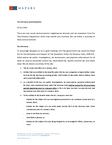
Tax Amnesty
Keywords: Mazars, Thailand, Tax, Revenue Code, CIT, VAT, Revenue Department
25 January 2016
1. The law came into effect on 1 January 2016.
2. Entities that are entitled to the benefits under this law are companies or legal entities whose revenue for the previous accounting period, which ended 31 December 2015 or before, does not exceed 500 million baht.
3. As a benefit of this law, tax audits, investigations, tax assessments, payment enforcement for taxes, and criminal sanctions under the Revenue Code shall be waived for all accounting periods beginning prior to 1 January 2016, or for a tax base incurred, revenue derived, and instruments executed prior to 1 January 2016.
4. To be entitled to the benefit under this law, taxpayers must not:
- already be the subject of a tax investigation pursuant to a tax summons issued prior to 1 January 2016;
- already be the subject of a tax audit under Section 88/3 of the Revenue Code which commenced prior to 1 January 2016;
- issue or use false tax invoices;
- claim false expenses; or
- already be the subject of a case being brought by an investigative officer, prosecutor, or court.
5. For those entities entitled to the benefits under this law, when they claim a tax refund, the Revenue Department will still have the power to perform a tax audit, tax assessment, issue a summons on performing a tax audit, or order the taxpayer to pay tax. However, this power shall be limited to the year for which the refund is requested.
6. To be entitled to the benefits under this law, the taxpayer must:
- notify the Revenue Department of its eligibility;
- file the applicable tax returns and pay the relevant taxes from 1 January 2016 onward;
- present true accounts and financial statements going forward (i.e. the accounts/financial statements for use by the management and those submitted to the Revenue Department must be the same); and
- not take any actions to evade tax.
7. For those entities that receive the benefits under this law, and the benefits have been subsequently withdrawn, the benefits will be deemed never to have been given. The Revenue Department will be free to perform any audit or assessment.
For more information about tax amnesty and exemption, click on the download link below.


